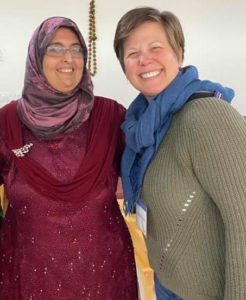
Israel Sojourn Provides Inspiration for Allegheny Environmental Science Professor
Allegheny College professor Beth Choate spent her winter holiday break touring Israel and visiting universities and other institutions of higher learning to find out more about how Israeli researchers are thinking about sustainable behaviors and methods that spark change.
What she took away from the trip was “amazing stories of sustainability as a result of limited land and resources in that country,” she says. “I wanted to travel to the country to learn more about culture, innovation and research that is taking place. This trip turned out to be a wonderful combination of learning about all three of these things.”
Choate, associate professor of environmental science and sustainability, was one of 25 educators from the United States who traveled to Israel as part of the 2019-20 Winter Faculty Fellowship Program sponsored by the Jewish National Fund-USA between December 26 and January 8. The goal of the program is to develop collaborations in research projects and establish an exchange program between faculty and students.

“The overall attitude of the Israelis that we met throughout the trip was inspiring,” Choate says. “Israel is an extremely diverse country. During our time, we met with Israeli Jews, Druze, Arabs, Bedouins, Ethiopian Jews and a variety of other groups. And each person that we met felt a connection to the place and a drive to make it better.
“Everyone we met was willing to take risks in their lives in order to create a better life for themselves, their families and their community,” she says.
Choate found many educators who she can collaborate with in future environmental science-related research projects. At the Vidor Center in the desert, researchers are working to create sustainable farming systems in arid environments, Choate says. The Arava Institute is creating a sustainable community in the heart of the desert, and at Tel Aviv University, researchers are exploring theories of positive psychology to move residents toward sustainability, she says.
Also, Choate found throughout Israel numerous organizations and individuals finding ways to bring the voices of marginalized groups to the table. “While this may not seem directly related to environmental science, it is a key aspect of sustainability and an important objective of the United Nations sustainable development goals. How do we use our resources in a sustainable way and create a sustainable life for all people? This was the piece that resonated with me and that I will bring into all classes and community work in the future,” she says.
For example, Choate points to her meeting with Ibtissam Machmeed, a women’s rights and interfaith activist, who has spent her life bringing young Jewish and Arab women together and empowering them for political service in Israel. “The stories of how many individuals are working to create a more just future for all are excellent and inspiring examples of how we bring people together around a common goal,” Choate says.
The Jewish National Fund is a philanthropic organization for Israel that supports critical environmental and nation-building activities in that country.